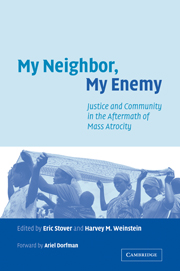Book contents
- Frontmatter
- Contents
- List of contributors
- Foreword by Ariel Dorfman
- Acknowledgments
- Introduction: conflict, justice and reclamation
- Part I Institutional approaches to justice
- Part II Social reconstruction and justice
- Part III Survivors and justice
- Conclusion: a common objective, a universe of alternatives
- Index
Conclusion: a common objective, a universe of alternatives
Published online by Cambridge University Press: 05 May 2010
- Frontmatter
- Contents
- List of contributors
- Foreword by Ariel Dorfman
- Acknowledgments
- Introduction: conflict, justice and reclamation
- Part I Institutional approaches to justice
- Part II Social reconstruction and justice
- Part III Survivors and justice
- Conclusion: a common objective, a universe of alternatives
- Index
Summary
Don't tell us
how to love, don't tell us
how to grieve, or what
to grieve for, or how loss
shouldn't sit down like a gray
bundle of dust in the deepest
pockets of our energy, don't laugh at our belief
that money isn't
everything, don't tell us
how to behave in
anger, in longing, in loss, in home-
sickness, don't tell us,
dear friends.
Mary OliverThis book set out to explore how communities rebuild themselves after war and mass atrocity, and what contributions, if any, criminal trials make to that process. So, what have we learned?
First, our studies suggest that there is no direct link between criminal trials (international, national, and local/traditional) and reconciliation, although it is possible this could change over time. In fact, we found criminal trials – and especially those of local perpetrators – often divided small multi-ethnic communities by causing further suspicion and fear. Survivors rarely, if ever, connected retributive justice with reconciliation. Reconciliation, in their eyes, was mostly a personal matter to be settled between individuals. When speaking about reconciliation, survivors often spoke of post-war encounters with past friends or colleagues from other ethnic groups, and only occasionally did they speak of reconciliation in the larger, collective sense of involving all members of an ethnic group.
Second, for survivors of ethnic war and genocide the idea of “justice” encompasses more than criminal trials and the ex cathedra pronouncements of foreign judges in The Hague and Arusha.
- Type
- Chapter
- Information
- My Neighbor, My EnemyJustice and Community in the Aftermath of Mass Atrocity, pp. 323 - 342Publisher: Cambridge University PressPrint publication year: 2004
- 12
- Cited by

